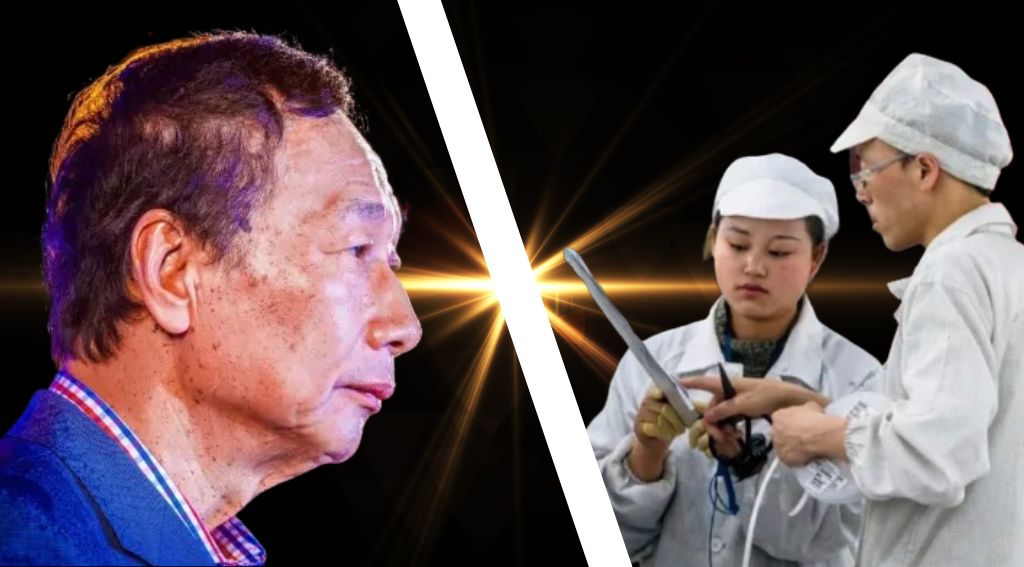Gou steps down from Foxconn Board to pursue Taiwan’s presidential bid

In a significant development, Terry Gou, the billionaire founder of Foxconn, a major Apple supplier, has officially resigned from the company’s board. The announcement of his departure, made by Foxconn is seen as a strategic move to protect the world’s largest contract AI electronics manufacturer from any potential political repercussions arising from his candidacy in the upcoming presidential election in Taiwan, scheduled for 13 January 2024.
Gou’s decision to step down also addresses concerns surrounding Foxconn’s substantial investments in China and the potential pressure he may face from the Chinese Communist Party, which seeks to bring Taiwan under Beijing’s control.
Ranked fourth place of the presidential election
Terry Gou maintains a significant stake in Foxconn, holding 12.5 percent of the company’s shares. However, he has not yet clarified whether he intends to place his shares in a trust or sell them to mitigate potential conflicts of interest.
The business magnate has entered a crowded presidential race, though current polling data indicates that his chances of victory appear slim. According to the latest survey conducted by Taiwan’s Formosa pollster, Gou’s support currently stands at 11.6 percent of the electorate. He trails behind two other opposition candidates and Lai Ching-te, the vice-president and candidate of the ruling Democratic Progressive Party, who leads the race with 35 percent support.
As tensions mount with China’s military pressure campaign against Taiwan, Gou and other opposition candidates have said that the election will be a pivotal choice between peace and war, attributing to the rising tension to the DPP government’s policies.
Pledge for peace
Gou has expressed support for closer economic ties with China and has pledged to bring 50 years of peace to the nation, a promise that has raised concerns among critics about potential concessions to Beijing.
Foxconn, renowned for operating the world’s largest iPhone manufacturing facility in China, has numerous large-scale factory complexes in the country, producing components for a wide range of electronic devices, including television sets and personal computers. While the company has been expanding to other regions like Vietnam, India, and Mexico in response to customer demands for diversified supply chains, approximately 75 percent of its operations continue to be based in China.
Terry Gou had already handed over the Foxconn leadership role to the current chairman, Young Liu, four years ago when he initially entered politics, vying for the Kuomintang nomination in the previous presidential election. When questioned about his intentions regarding his Foxconn shares in the event of a successful presidential bid, Gou stated that he had never engaged in business dealings with the Taiwan government, asserting, “Not a single deal! So I can withstand scrutiny.”
Foxconn has cited Gou’s resignation as a director due to “personal reasons”. The company also added that there are no plans to replace him at this stage.
Foxconn forecasts substantial growth
Foxconn, renowned as Apple’s primary manufacturing partner, is poised to witness substantial growth in its AI server business in the second half of this year. This projection reflects the company’s anticipation of at least doubling its AI server business, aligning it with the escalating demand for generative artificial intelligence systems.
The growing dependence on AI is propelling the surge in demand for AI servers. This development echoes the trajectory of chip designer Nvidia, which has recently become the most valuable semiconductor company, largely due to the increased demand for processors in AI servers.
While Foxconn is primarily recognized for its role as Apple’s manufacturing partner, it boasts a diverse portfolio encompassing a wide range of electronic products and components, from computers and industrial robots to electric vehicles and semiconductors. In addition to supplying branded vendors like Dell, Foxconn, alongside competitors such as Quanta Computer, also manufactures servers directly for major data centre users such as Google and Amazon.
Increased demand driven by AI growth
For Foxconn, AI servers accounted for 20 percent of its server business revenue, contributing to approximately US $215 billion revenue generated from server manufacturing, where it holds a substantial 40 percent global market share. This positive forecast aligns with the broader industry trend, as companies like Nvidia and Taiwan Semiconductor Manufacturing also report increased demand driven by AI-related growth. Notably, Nvidia recently raised its revenue outlook due to the exponential expansion of data centre capacity required for AI system training.
Year-end results 2023
Despite this upbeat outlook for AI server sales, Foxconn remains cautious about its overall performance in 2023 due to uncertainties stemming from inflation and geopolitical tensions, reiterating the expectation of flat revenues compared to the previous year.
Although Foxconn’s primary focus is assembling tech gadgets and manufacturing lower-end components, the company plays a pivotal role in the AI server ecosystem, providing various components such as connectors, chassis, cooling systems and motherboards. These components collectively contribute to the AI server’s momentum, despite assembly and testing accounting for a smaller portion of the overall cost.
Shielding the company from political ramifications
Gou’s candidacy in Taiwan’s upcoming presidential election in January 2024 will make an impact on the Foxconn’s substantial investments in China and potential pressure from the Chinese Communist Party. While tensions between China and Taiwan continue to escalate, Gou’s promises closer economic ties with China. Despite the optimistic outlook for AI server sales, Foxconn remains cautious about its overall performance in 2023. It is important for Foxconn to ensure the industry of its continued relevance and stability in the industry. The repercussions, if any, of Gou’s departure as a Director of Foxconn are still be be seen.
Related topics:
AIBC Forex: Meeting new investment challenges
Implementation strategy for the launch of a new start up (aibc.world)






